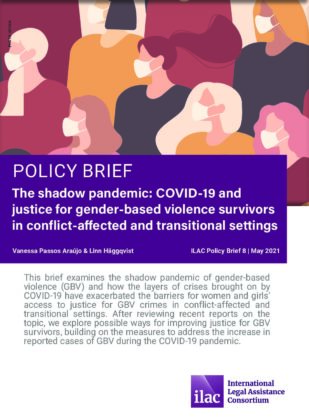Summary
This brief examines the shadow pandemic of gender-based violence (GBV) and how the layers of crises brought on by COVID-19 have exacerbated the barriers for women and girls’ access to justice for GBV crimes in conflict-affected and transitional settings. After revising recent reports on the topic, we explore possible ways for improving justice for GBV survivors, building on the measures to address the increase in reported cases of GBV during the COVID-19 pandemic.
Key Recommendations
- Governments worldwide took key immediate justice solutions at the start of the COVID-19 pandemic in 2020. Helplines and digitalisation of case management and court proceedings for GBV crimes were amongst some of the main solutions. While not sufficient, immediate measures are a key step to removing legal obstacles to women’s and girls’ access to justice and to provide accountability to GBV crimes and should remain in place beyond the COVID-19 pandemic.
- Violence and crimes against women and girls will not end when the COVID-19 pandemic does. Judicial systems will need to be reinforced and prepared to deal with a high number of cases accumulated during the pandemic and the effects of the economic crisis that follows on the number of GBV cases.
- Digital justice is not enough to close the gap of the decrease in in-person legal aid services during the pandemic for GBV survivors living in transitional and conflict-affected settings. The existing digital gap for women and girls must be minimised so that access to justice is guaranteed.
- The future of justice for and prevention against GBV crimes in transitional and conflict-affected settings should include basic e-justice, but it must be accompanied by an inclusive digitalisation process, legal reform to include laws that aim to eliminate GBV, trainings and awareness-raising of the entire chain of justice – from judges to customary justice chiefs, from the police force to healthcare workers – aimed at countering gender stereotyping, victim-blaming and other harmful practices as well as empowerment of grassroots women’s organisations.
Authors: Vanessa Passos Araújo, Programme Officer at ILAC and Linn Häggqvist, Programme Officer at ILAC.

